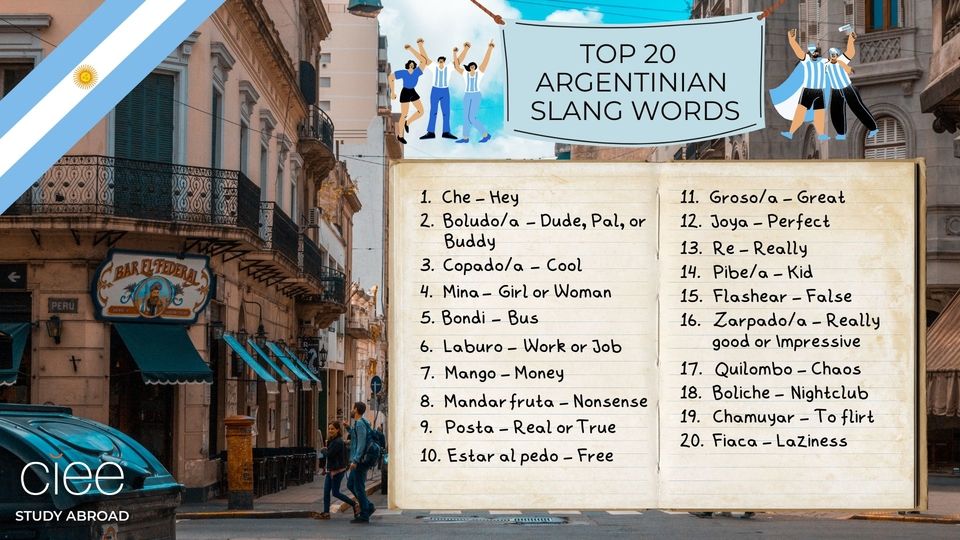Top 20 Argentinian Slang Words and Phrases You Must Know
Heading to Buenos Aires, the cosmopolitan capital of Argentina? If so, now’s the time to brush up on your lunfardo or Argentinian Spanish slang! Mastering the Spanish language goes beyond studying basic grammar, vocabulary, and common greetings. Kick your language skills and proficiency up a notch by practicing slang for Argentinian Spanish. Once you do, you’ll have a strong handle on the color, humor, and authenticity of how Argentines communicate, helping you blend in with the local community so you can connect with your peers on a deeper level.
Let’s dig into 20 of the top Argentinian slang words, Argentinian slang phrases, and Argentinian slang expressions to deepen your cultural immersion while studying abroad in Argentina.

Understanding Lunfardo: A Brief History
Before we dive into our top 20 list, let’s briefly explore what lunfardo is.
Lunfardo originated in the late 19th and early 20th centuries among the working-class neighborhoods of Buenos Aires. It was a form of slang largely influenced by the diverse mix of immigrants from Italy, Spain, France, and other European countries. At the time, many speculated lunfardo was conceived by criminals to communicate without others (mainly the police and prison guards) knowing what they were saying, but this theory has not been confirmed. Over time, lunfardo spread from the lower classes to all sectors of Argentine society, primarily thanks to tango lyrics, which often incorporated lunfardo terms.
You may see lunfardo and Argentinian slang used interchangeably, therefore understanding the roots of lunfardo is essential as you develop your Argentinian Spanish slang vocabulary.
Read More: Eat, Drink, Explore: Buenos Aires
Top 20 Argentinian Slang Expressions and Words
Argentinian Slang #1: Che
Meaning: “Hey.”
Beginning with the basics, “che” is arguably the most quintessential Argentine slang word. It's an interjection used to grab someone's attention, similar to "hey" in American English or "mate" in British English. You’ll hear it everywhere in Argentina, and it’s a great way to sound more authentic.
For example: “¿Che, me hacés un favor?” (“Hey, can you do me a favor?”)
Argentinian Slang #2: Boludo/a
Meaning: “Dude” or “Pal” or “Buddy.”
Argentinian slang for “dude,” “boludo” (for a male) or “boluda” (for a female) can be a term of endearment among friends or a mild insult. It literally translates to "fool" or "idiot," but context is key. Among friends, it's often used affectionately. Keep this Argentinian slang for friend in your back pocket to address someone you consider a pal!
For example: “¿Qué hacés, boludo?” (“What's up, dude?”)
Argentinian Slang #3: Copado/a
Meaning: “Cool.”
A common Argentinian slang for “cool,” use “copado” when you’re trying to express a moment of satisfaction, happiness, joy, etc. The word has a positive connotation.
For example: “¡Qué copada esa remera!” (“What a cool t-shirt!”)
Argentinian Slang #4: Mina
Meaning: “Girl” or “Woman.”
Argentinian slang for “girl,” “mina” is one of the most widespread slang terms in Argentinian Spanish. It is a colloquial term for “woman” the same way we use “chick” or “gal” in American English.
For example: “¿No viste esa mina?” (“Did you see that girl?”)

Argentinian Slang #5: Bondi
Meaning: “Bus.”
An essential term for navigating public transportation, “bondi” is Argentinian slang for bus.
For example: "Voy a tomar el bondi." ("I'm going to take the bus.")
Argentinian Slang #6: Laburo
Meaning: “Work” or “Job.”
Derived from the Italian word “lavoro,” “laburo” is the Argentine word for “work.” This term is commonplace in many conversations between Argentines, particularly in workplaces.
For example: "Tengo mucho laburo hoy." ("I have a lot of work today.")
Argentinian Slang #7: Mango
Meaning: “Money.”
Unlike the typical Spanish word for money (“dinero”), “mango” is used in the context of being broke. It’s a popular slang word to describe someone who doesn’t have money.
For example: "No tengo un mango." ("I don’t have any money.")
Argentinian Slang #8: Mandar fruta
Meaning: “Nonsense.”
“Mandar fruta” literally means “to send fruit,” but in the context of Argentinian slang, it means “to talk nonsense” or “to lie.”
For example: "No le creas, está mandando fruta." ("Don’t believe him, he's talking nonsense.")
Read More: The 6 Best Places to Learn Spanish Abroad
Argentinian Slang #9: Posta
Meaning: “Real” or “True.”
“Posta” is used to confirm the truth of a statement. It’s best used to explain that something is real.
For example: "¿En serio?" (“Really?”) / "Sí, posta." (“Yes, really.”)
Argentinian Slang #10: Estar al pedo
Meaning: “Free.”
Use the Argentinian slang expression “estar al pedo” to express when you’re free, you have nothing to do, or when you’re idle.
For example: “Estoy al pedo, ¿querés salir?” (“I'm free, wanna go out?”)

Argentinian Slang #11: Groso/a
Meaning: “Great.”
"Groso" (for males) and "grosa" (for females) is used in the context of describing someone as great, amazing, or awesome. It’s a high compliment in Argentine slang.
For example: "¡Sos un groso!" ("You’re awesome!")
Argentinian Slang #12: Joya
Meaning: “Perfect.”
"Joya" literally means "jewel" but in Argentinian slang, it means "perfect" or "great."
For example: "¿Todo bien?" ("All good?") / "Joya." ("Perfect.")
Argentinian Slang #13: Re
Meaning: “Really.”
"Re" is a prefix used to intensify adjectives, similar to "really" or "very" in American English.
For example: "Estoy re cansado." ("I’m really tired.")
Read More: Popular Argentine Hand Gestures
Argentinian Slang #14: Pibe/a
Meaning: “Kid.”
"Pibe" (for boys) and "piba" (for girls) are informal terms for children or young people.
For example: "El pibe está jugando afuera." ("The kid is playing outside.")
Argentinian Slang #15: Flashear
Meaning: “False”
This Argentinian slang word refers to something unrealistic or false.
For example: “Estás flasheando, eso no pasó.” (“You're making that up, that didn't happen.”)
Argentinian Slang #16: Zarpado/a
Meaning: “Really good” or “Impressive.”
The literal translation of “zarpado” is “to set sail” but in Argentinian slang it's used to describe something outrageous, impressive, and all around good.
For example: “¡Qué zarpado ese gol!” (“What an amazing goal!”)
Argentinian Slang #17: Quilombo
Meaning: “Chaos.”
Dealing with a huge mess? Use the Argentinian slang word “quilombo” to describe the messy, chaotic, and/or complicated situation.
For example: “No puedo ir, tengo un re quilombo en casa.” (“I can't go, I have a huge mess at home.”)

Argentinian Slang #18: Boliche
Meaning: “Nightclub.”
If you’re looking to head to a nightclub with friends, be on the lookout for a “boliche.” Originally, this term referred to small stores but these days it can refer to both discos and bars.
For example: “¿A qué boliche vamos esta noche?” (“Which club are we going to tonight?”)
Read More: Top 10 Spanish Slang Words and Phrases You Need to Know
Argentinian Slang #19: Chamuyar
Meaning: “To flirt.”
“Chamuyar” has many meanings in Argentine slang: To flirt, seduce, or sweet-talk someone. However, it can also mean to lie or exaggerate.
For example: “No le creas, te está chamuyando.” (“Don't believe him, he's just sweet-talking you.”)
Argentinian Slang #20: Fiaca
Meaning: “Laziness”
"Fiaca" refers to laziness or the feeling of not wanting to do anything. It’s commonly used to describe a lack of motivation.
For example: "Tengo fiaca de levantarme." ("I feel too lazy to get up.")
How to Learn Argentinian Slang
With these Argentinian slang words and phrases in your pocket, you’re well on your way to developing your Spanish language skills. Continue to learn and develop your proficiency in the following ways:
- Listen and Observe: Pay attention to how locals use these words in different contexts. Listening to Argentine music, especially tango and cumbia, can be particularly helpful.
- Practice with Locals: Don’t be afraid to use these words when speaking with Argentines. They’ll appreciate your effort to learn their unique slang.
- Watch Argentine Media: TV shows, movies, and YouTube channels from Argentina are great resources for hearing slang in action.
- Stay Updated: Slang evolves over time, so keep up with new terms and changes in usage. Social media and online forums can be good places to learn what’s current.
Put Your Argentinian Slang to Use
Mastering Argentinian slang is a fun and rewarding way to deepen your understanding of the local culture and connect more authentically with Argentines. Whether you’re navigating the bustling streets of Buenos Aires or chatting with Argentine friends, these 20 slang words and phrases will help you sound like a true porteño.
So, if you’re heading to Argentina, don’t just stick to textbook Spanish – embrace the lunfardo and watch how it transforms your experience abroad.
Related Posts

Traveling to Patagonia While Abroad in Buenos Aires
By: Liliana Micera Studying abroad in Buenos Aires has been incredible, but once my classes ended I fled the city for the nature of Argentina’s south. I cannot recommend traveling... keep reading

What are the Best Places to Study Abroad in Latin America?
If you’re reading this, you’re probably ready to take your college experience to the next level with an extraordinary study abroad adventure. What better way to do than by discovering... keep reading

Study Abroad in Latin America: The Ultimate Guide
Deciding where to study abroad can be as thrilling as it is daunting, especially with so many amazing Latin America study abroad programs and countries to choose from. We get... keep reading

